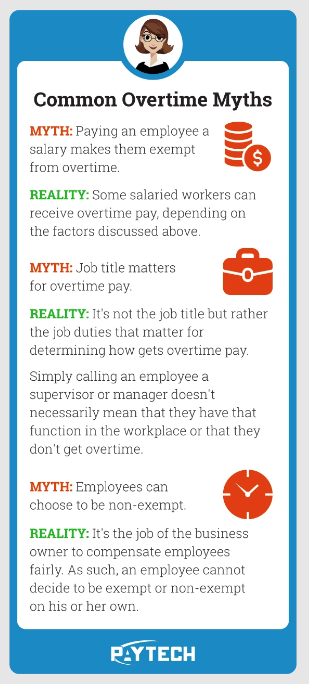
Most business owners will eventually have to deal with overtime. What you may not expect, though, is that you may have to deal with overtime for salaried employees. Understanding the basics of Arizona overtime for salaried employees will help you to stay within the bounds of the law and to understand your responsibilities to your employees.
Every state has unique overtime rules. For the most part, though, Arizona’s rules follow the federal law. As such, it’s always a good idea to take a look at the reality surrounding overtime laws and to figure out how they apply to you.

Salaried employees are fairly common in many workplaces. These are individuals who have a guaranteed minimum amount of money they will make per pay period rather than an amount of money that is tied to the number of hours they might work. These positions are often, but not always, white collar or administrative positions that come with some form of authority.
When determining if an employee is eligible for overtime pay, one typically looks at three factors. Since one of these factors is typically whether or not the employee is salaried, it’s possible to ignore the first test and move on. That means that it’s necessary to look at two more factors – how much money the employee makes, and what type of work the employee performs. Each of these factors will play a role in determining the employee’s eligibility for overtime pay.
The first factor, pay, has been determined on a federal level. If the employee makes below the federal threshold (an amount that is currently in flux), the employee is not exempt for overtime pay. While Arizona typically follows the federal laws on such matters, the state does require that salaried employees make at least the state minimum wage. As such, salaried employees who make below that threshold can actually be eligible for overtime.
"An employer can legally pay exempt employees for overtime. The pay can be a bonus, a flat sum, time-and-a-half or extra time off. Federal law does not, however, require that employers offer this extra compensation."
-smallbusiness.chron.com
The other major factor is the type of work the employee does. Certain ‘professional’ jobs are thought to be exempt from overtime requirements due to the nature of the job. Teachers and lawyers, for example, are generally both considered to be professionally ineligible for overtime pay. In most cases, individuals who meet these criteria are also individuals who will exceed the federal income limits for overtime eligibility.
To a certain degree, determining employee exemption is a matter of looking at what the employee does as well as how much the employee makes. The vast majority of employees in typical settings are non-exempt workers, but these employees are also typically paid by the hour. As such, it’s usually reasonable to look at the types of functions that might be considered exempt when looking at overtime for salaried employees.

In most cases, supervisors and administrators are considered exempt from overtime requirements. This means that these individuals either oversee the work of others or who do administrative work that is beyond the level of simple clerical work. These are the people who typically receive a salary because their hourly requirements are much harder to calculate than the average employee. These individuals, along with those with professional roles, don’t receive overtime pay because their compensation is meant to reflect the higher number of hours that are meant to be worked over the course of a week.
Overtime, like most things in the business world, is hard to understand if you’re not dealing with it on a daily basis. Below are some common falsehoods that circulate in regards to overtime:

Realistically, you will probably need to take a look at your currently exempt employees and determine whether or not they would still be exempt under the current rules. It’s a good idea to look at more than just the pay scale, though, so that you are aware of exactly how each employee should be calculated. It may be the case that your business will continue along as it always has, but it never hurts to take a second look so you can make the right choices.
If so, you might want to get professional help. When you’re ready to get the professional assistance you need for your payroll, make sure to contact PayTech to check out our packages and pricing.